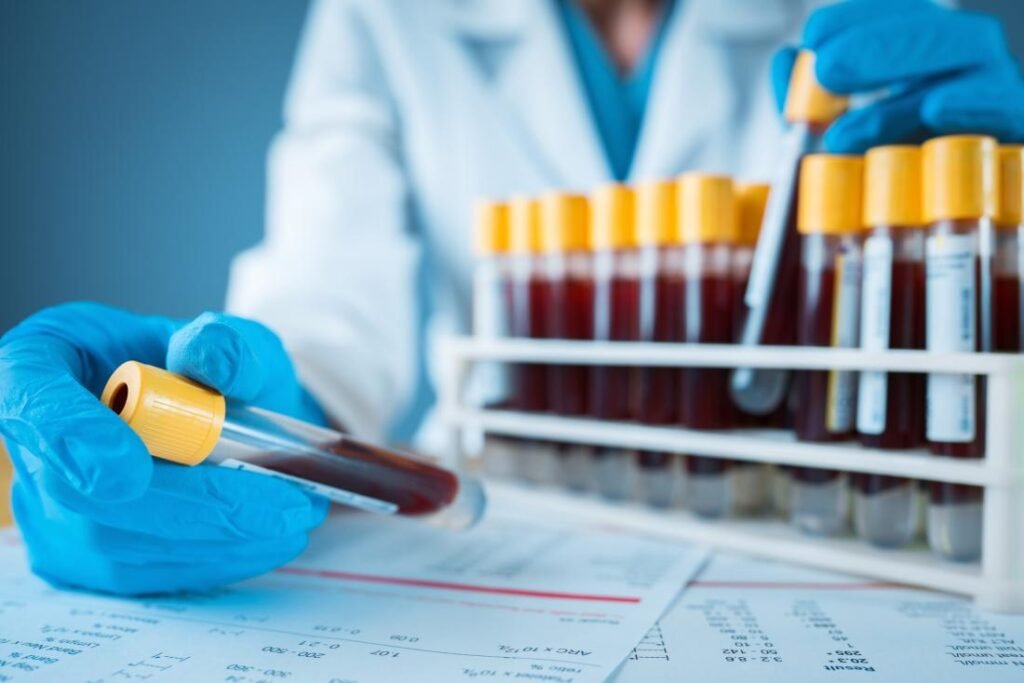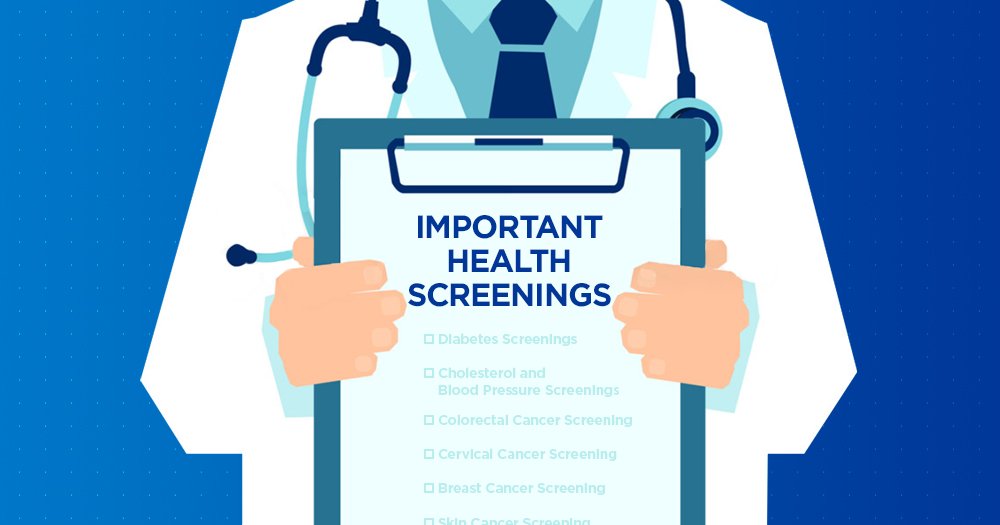What is health screening?
Health screening tests for early detection of diseases or problems in people before they start having symptoms. It comprises physical examinations, blood tests or other medical procedures.
Who should go for a health screening?
Health screening can detect a problem early before one noticed having any symptoms, so it is necessary for everyone. Early detection of a problem also means earlier and more effective treatment. In addition, finding out you have a health problem or a higher risk of having a health problem can help you make better-informed decisions about your health.
What is the difference between health screening and the tests my doctor orders when I am injured or unwell?
Health screening tests are more focused on detecting disease(s) in people who are or feel well, while diagnostic tests are done when a person is already showing signs and/or symptoms of a disease.
Why is health screening important? Why should I get one?
Health screenings are important because it helps detect if you have any underlying disease or condition. It also helps to tell if you are at high risk of having it – even if you feel generally healthy. Firstly, the tests in these screenings will provide information about your general health. And with an early diagnosis, you can then learn what is necessary to improve your condition or prevent it from becoming worse. Discovering health problems earlier also means having managed when they are easiest to treat.
Other than that, health screenings are done regularly to help us to maintain good physical well-being. Getting regular checkups as recommended by your physician can prevent deaths and fatal diseases. For example, breast cancer and colon cancer are treatable cancers when detected early but can be terminal and death-dealing if it is discovered too late. A routine exam can detect a growth such as a colon polyp and have it removed before it becomes cancerous. Heart disease, on the other hand, can be detected and treated early to prevent, it via routine blood pressure and cholesterol checking. Subsequently, this simple step and little effort from you could just prevent a heart attack or stroke episode.
Above all, health screenings are all about making important and responsible choices for your own health. So don’t put off your health screening as it can save your life. At QM CARE, health screening packages can be tailored to your needs at the most reasonable and affordable prices.
Getting Started

Certainly, it’s never too late to start taking charge of your health. The first step is to visit your health care provider, and then, discuss the health screening packages or tests that are right for you. Also, several factors that will be taken into account include your age, gender, family health history and personal health history.
Why do I need to go for health screening at recommended frequencies?
To clarify, health screening will only be able to pick up health conditions or problems that are present at the time of your screening. Thus, regular screenings at recommended periods are necessary to help detect conditions that may develop after the previous screening. They are also mandatory to monitor the progression of an existing disease or condition.
There are many health screening packages. How do I know which is the right package for me?
Fret not, usually your physician will recommend you the ideal health screening package that you need. And this will largely depend on several factors such as your family history (if there is anyone in your family that has a history of cancer, diabetes or heart disease), age (older patients tend to develop more problems), lifestyle (smokers and those who lead a sedentary lifestyle) and any present health complaints.
Getting to know your tests

Blood tests are also used to:
- Help diagnose certain diseases and conditions
- Monitor a chronic disease or condition
- Find out if treatment for a disease is working
- Check how well your organs are working. Your organs include your liver, kidneys, heart, and thyroid.
- Help diagnose bleeding or clotting disorders
- Find out if your immune system is having trouble fighting infections
All in all, blood testing can save your life as it provides an overview of your current health.
Our basic screening includes :
- Full Blood Examination
- Haemoglobin
- Red Blood cell count
- RDW
- Packed cell Volume
- Platelet count
- White cell count and its differentials
- MCH (Mean Corpuscular Hemoglobin)
- MCV (Mean Corpuscular Volume)
- ESR (Erythrocyte Sedimentation Rate)
- Peripheral Blood Film
- Blood Grouping
- Renal Function Test
- Sodium
- Potassium
- Creatinine
- Urea
- Chloride
- Calcium and Adjusted Calcium
- eGFR
- Uric Acid
- Liver Function Test
- ALT (Alanine Transaminase)
- AST (Aspartate Transaminase)
- ALP (Alkaline Phosphatase)
- GGT (Gamma-Glutamyl Transferase)
- Total Protein
- Albumin
- Globulin
- Albumin-Globulin Ratio
- Total Bilirubin
- Lipid Profile
- Total Cholesterol
- HDL
- Non-HDL
- LDL
- Triglycerides
- Cholesterol/HDL Ratio
- Diabetic Screening
- HbA1c
- Glucose level
- Thyroid Screening
- TSH (Thyroid Stimulating Hormone)
- Immunology and Serology
- Rheumatoid Factor
- Hepatitis Bs Antigen
- Hepatitis Bs Antibody
- HAV Total Antibody
- HIV Ag/Ab Screening
- Treponema Pallidum Antibody (Syphilis)
- Urine Examination :
- Urine FEME (Appearance, pH, Specific Gravity, Nitrite, Protein, Glucose, Ketone, Urobilinogen, Bilirubin, Blood)
- Microscopy (RBC, WBC, Epithelial Cell, Cast, Crystal, Bacteria, Mucus, Others)
Individual / Additional Tests include :
- Covid-19 Antibody Test
- Full Blood Examination
- Gout
- Diabetes Screen
- Renal Function Test
- Liver Function Test
- Lipid Studies
- Iron Studies
- Urine Examination
- Immunology & Serology
- Tumour Markers
- Endocrinology Test
- Alpha Fetoprotein
- Anti-cyclic citrullinated peptides (anti-CCP)
- Beta HCG
- CA 125, CA 15-3, CA 19-9
- Carcinoembryonic Antigen
- C-Reactive Protein
- Cystatin C
- EBV VCA IgA (Nasopharyngeal Carcinoma Screen)
- Follicle Stimulating Hormone
- Free T3
- Free T4
- Hemoglobin A1c (HbA1c)
- Helicobacter Pylori Antibody
- Hepatitis A Antibody (Total), Hepatitis B Screening (HBsAg & HBsAb), Hepatitis C Antibody
- High Sensitivity CRP
- HIV Ag/Ab Screening
- Homocysteine
- Luteinizing Hormone
- Prostate-Specific Antigen (PSA)
- Testosterone
- Thyroid Stimulating Hormone (TSH)
- Urine Microalbumin
- Vitamin D
- Risk Stratification High Sensitive Cardiac Troponin 1
- Others
Lastly, to find know more about the tests and services QM CARE has to offer, contact us or our careline at 0333100097 and our customer specialists will be at your assistance. And if you’re keen, you can also book your doctor’s appointment online with us right away!




